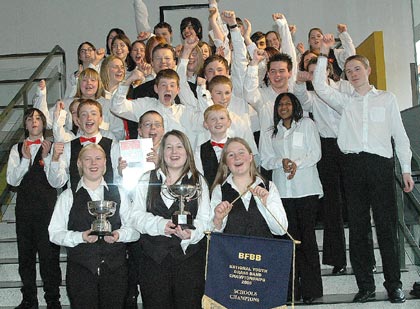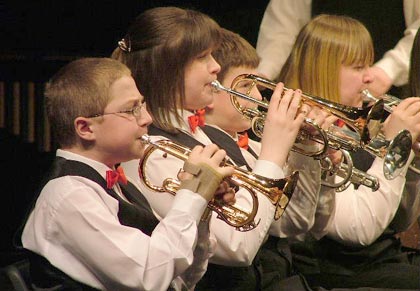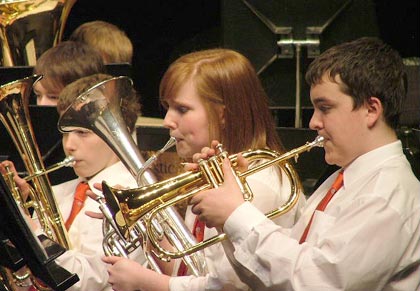2006 National Youth Brass Band Championships - Schools Championship
12-Apr-2006Just the two battled it out for the title of being the best school band in the country, and it proved to be a close run thing.
As with the Premier Championships, there was genuine disappointment that the Schools Championship could only attract just the two competitors. That couldn't be said though for the standard of performances put on by Smithills School and Abraham Darby School conducted by Chris Wormald and Wayne Ruston respectively, although just like the top section both were more 18 than 24 carat in overall quality.

The winning feeling: Smithills celebrate yet another National title
The experience of both conductors was well used on the day as both made the most of their compact resources with well chosen programmes. Both were generously awarded Gold Awards from adjudicators Major Peter Parkes and John Berryman – perhaps they both really should have been given Silver Awards as a more realistic appraisal of their efforts, but when there are just two bands to compare it is difficult to ascertain just where to set the marker, especially when there is no indication from the organisers what constitutes a gold, silver or even bronze.
John Berryman had picked the short straw and made his comments just as briefly too. "There was such a high standard from both the bands here today. There were two very good performances, but we went for the one that was neater and slightly better in tune. It was still very close though."
With that in mind it didn't come as a complete shock that Smithills School won, but they were run very close and it was certainly not a performance out of the very top draw by their usually impeccable standards. There was certainly a sign of relief on the face of Chris Wormald at the announcement of the result as he confided that he felt they may have left the door open on the day after making a few too many annoying errors throughout their programme.

No 'arm done: Smithills young sop player performs through the pain barrier
That programme started with Kenneth Alford's old pot boiler of a march ‘The Great Little Army' which given the small numbers in his band, certainly sounded apposite enough. It was net and tidy (although we wish they wouldn't fall into the trap of believing that turning inwards from their usual playing positions does anything to make the sound quieter – it doesn't) and there was real balanced between the different sections and some fine solo cornet playing from Rachel Fenton who was making her last appearance with the band. It may have just lacked that sense of ‘chest out', ‘eyes front' swagger that all Alford's marches have, but it was a well chosen start, neatly executed.
That was followed by Chris Wormald's arrangement of the ‘Lord's Prayer' that unfortunately showed the one weakness of his band off to the full – the lack of warmth in their tone. The exception was the bands fine little soprano player who had a lovely sweet tone, as well as an arm in a protective bandage after he broke it a couple of weeks ago. He played through the pain barrier like a Trojan. Even with his effors though the loud ending was harsh and overblown and a little out of keeping with the subject matter perhaps.
The Edward Gregson test piece ‘Partita' meanwhile was given a thoroughly good outing and each of the three movements had just the right approach in terms of style and delivery. The drama of the first movement was captured well, as was the sense of despair and doom in the second with the religious overtones of the ‘Agnus Dei' well maintained. The third section came to life and was well controlled right through to the last note. It was a well rehearsed performance.
Finally, they very nearly threw away their victory with a sloppy bit of playing on the MD's arrangement of the march form the ‘Pines of Rome' which (as is the case in just about every performance we hear of the work from brass bands) featured wrong rhythms in the pick ups to the phrases and the usual wrong playing of the groups of fives.
It all sounded just a bit over stretched and perhaps a piece too far for the band on this occasion.
Abraham Darby certainly came out with all guns blazing with a cracking opener in the form of the old Salvationist march, ‘Goldcrest' which was neat and balanced and very well delivered with some fine solo cornet work and a cracking bit of soprano playing that added a just the right amount of gloss to a sparkling bit of playing.

Giving it 100%: Abraham Darby School battle it out for the title
The test piece however was not quite of the same quality though, although the opening section was again well balanced and very detailed. It was the second movement that showed up their weaknesses and like their counterparts they too suffered from the lack of warmth in their tone. It became a little nervous in places, but the MD pulled his forces together and they soon recovered. A decent final section brought things back on track, but again the lack of warmth in the tonal quality of the band and the cornets in particular was noticeable and just took the edge off what could have been an excellent performance.
That left them with their final item the Elvis inspired ‘American Trilogy'. We don't now how many of these youngsters are Elvis fans (not many we would bet) and that may have possibly been the reason why the piece just lacked that OTT feeling of the ‘The King' swaying his hips in his rhinestone white jump suit in his Vegas heyday.
Elvis is Elvis – and it cannot sound like anything else, and to be fair not even such an experienced arranger as Goff Richards can do him justice. Try as they might it all felt misunderstood, if you get our meaning. A bit like asking Black Dyke to play music by the Zutons or S Club Seven. Still it was enjoyable fare, but wasn't perhaps the wisest of choices to highlight the bands more obvious qualities.
It rounded off a contest that certainly had its moments of quality, but also showed a slightly worrying amount of coldness in much of the playing. Technically it was very good from both bands, but musically, it perhaps needed a bit more thought on behalf of the two MD's. You don't always have to try and give the audience a huge finisher every time you play.
Iwan Fox















